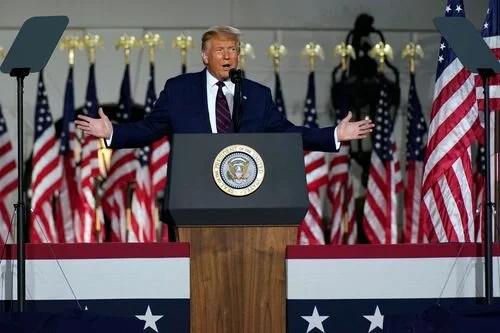A new era of party conventions and partisan demonization By Luke Perry
This year’s national party conventions were very different from the 2016 conventions I covered as a floor correspondent. Conventions as we knew them are dead as parties increasingly seek to develop appeals conducive to the social media era of public communication.
Deliberation over presidential nominees emerged from the first competitive presidential elections in 1796 and 1800, following the retirement of George Washington. Current personal attacks and dishonesty echo ugliness surrounding the Federalists, led by John Adams, and the Democratic Republicans, led by Thomas Jefferson, competing for dominance in the post-Washington era.
Remarkably; however, the election of 1800, where Jefferson defeated Adams, constituted the first peaceful transition of power between political parties in world history, beginning a vital American tradition that persists to this day.
Formal party conventions began in 1832, as the U.S. embarked on a long transition to democracy, which slowly enabled more people to participate in the electoral process. Convention sites moved around the country throughout the 1800s, as transportation networks advanced westward.
T.V. cameras came on the scene in 1948, spawning a strategic desire to appear united. By 1972, the outcome of the primary was known in advance, shedding public deliberation and multiple ballots on the convention floor.
This year’s heavily virtual conventions, ushered in by the COVID pandemic, meshed the mediums of cable news, campaign ads, and social media. Second and third tier speeches, which typically constituted hours of convention proceedings no one in the arena actually listened to, were largely replaced by human interest appeals, making for better television and viral clips. It is hard to envision either party going back.
Both parties highlighted everyday people much more than previous conventions. Farmers, industrial workers, teachers, and small business owners, shared their stories and pitched their party’s nominee. This was more captivating for viewers, and more effective politically, given the inherent challenges of attacking non-public figures.
Republicans featured daily doses of Donald Trump, often theatrical performances accentuating his reality T.V. persona. The format upended the traditional role for a nominee, including publically funded official business on government property, contradicting federal law prohibiting government employees from using “official authority or influence for the purpose of interfering with or affecting the result of an election.” Ultimately, Republican convention delegates and watchers got what they wanted, more Trump.
Photo from White House
John Adams and Thomas Jefferson hated each other while political foes, but reconciled and became pen pals in retirement. Jefferson was too ill to accept a speaking invitation on the 50th anniversary of the Declaration of Independence. That day John Adams said his last words, “Thomas Jefferson survives,” not knowing Jefferson died just hours before him.
One line in the draft of Jefferson’s speech read: “May the Declaration of Independence be to the world, what I believe it to be, the signal arousing men to burst the chains under which monkish ignorance and superstition had persuaded them to bind themselves, and to assume the blessings and security of self-government.”
The 2020 conventions displayed how both parties agree on one thing. This is the most important election in U.S. history.
Partisans on both sides have increasingly viewed their political opponents as immoral, unintelligent and closeminded. These divisions are primed to test the blessings and security of self-government like few other presidential elections.
The lives of John Adams and Thomas Jefferson provide a hopeful path forward. If they could learn to set aside their partisan animosity, and move beyond ignorance and superstition, so can we.







